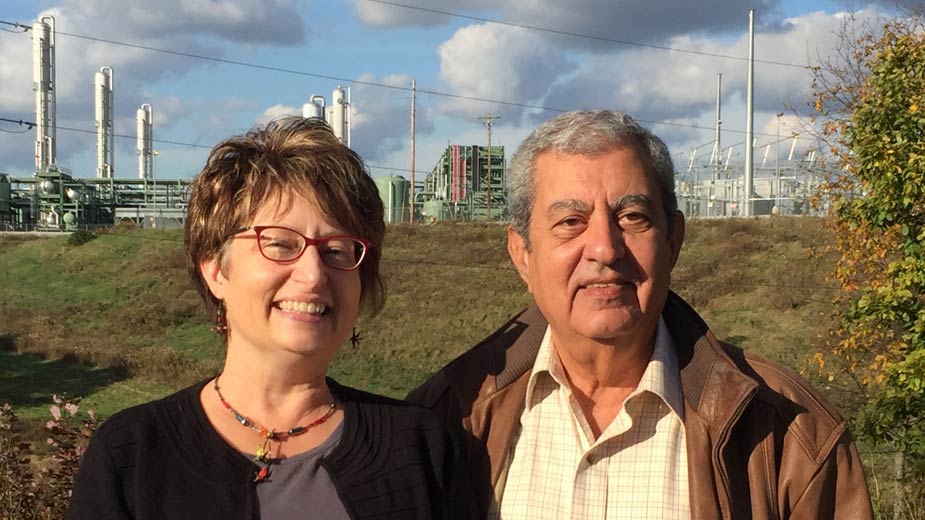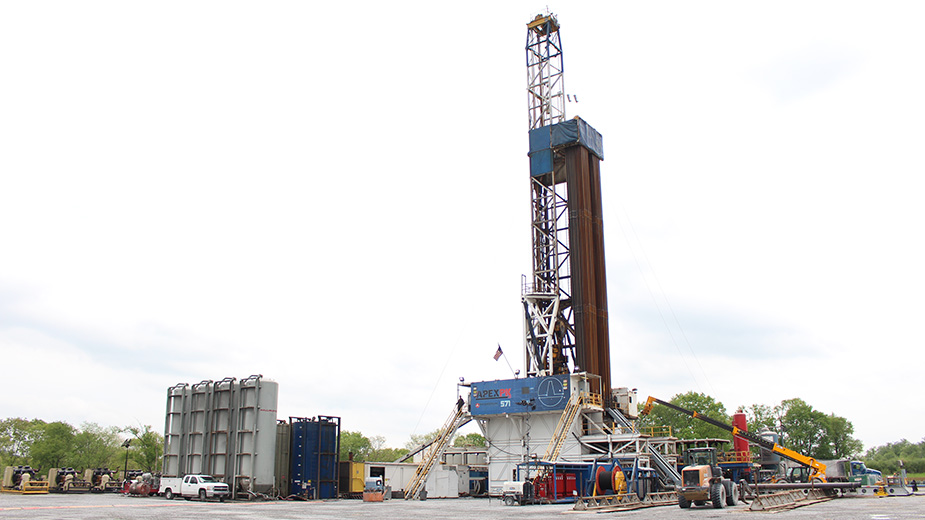Iraqi Delegation Explores Oil and Gas Industry in Utica
KENSINGTON, Ohio — A delegation of seven who represent Iraq’s oil and gas industry received an up-close look at how energy companies in the United States employ sophisticated technology to tap into Ohio’s vast shale reserves.
Still, the participants say, they’re unclear about how this technology could help their companies in the oil-rich nation that, over the past decade, has been ravaged by war and economic instability.
“From what I know, such techniques can’t be used in our country because the shale is set at a very deep level in the ground,” said one participant – an engineer speaking through interpreter Elie Saliba.
The participants requested that their names or photographs not be used for fear of possible reprisals when they return to Iraq.
The seven Iraqis are participants in the U.S. Department of State’s International Visitor Leadership Program, which is designed to build a better understanding between this nation and other countries.
The local leg of the program was administered through Global Ties Akron, a not-for-profit organization housed at the University of Akron.
Among the objectives of the program are the increase of general knowledge of how the U.S. practices business and entrepreneurship in particular industries.
The delegation spent three weeks in the United States, touring sites in Texas, Washington D.C., Virginia, Maryland and, last, Ohio, before they returned.
While in Ohio, the engineers met with faculty at Stark State College in Canton, then received a briefing Oct. 26 and overview of the oil and gas industry in Ohio from The Business Journal.
Global Ties Akron was established 40 years ago to foster international understanding and communication, said its executive director, Michelle Wilson.
“We work on a whole variety of topics,” she explained. “We’ve worked on everything from interfaith dialogue, to health issues, to higher education and immigration and refugee settlement.”
International entrepreneurship is a growing part of the program, Wilson added, and the oil and gas industry in Ohio is particularly relevant in the global economy.
“I’ve had two different groups from France” interested in the oil and gas industry, she said.
One participant was a government official who worked in the southern part of the country and wanted to observe firsthand how hydraulic fracturing has affected both the industry and the environment.
“He wanted to look at the pros and cons,” Wilson said, “and get an assessment that he could take home with him.”
Another French group wanted to explore the environmental impact of the oil and gas industry in Ohio, while at the same time assess which energy companies were drilling in the Utica and the precautions these companies are taking to ensure the public’s safety.
Participants in the International Visitor Leadership Program are first selected by U.S. embassies, which help identify leaders in their particular fields and issues of mutual interest between those countries and the United States, according to Wilson.
Another national agency handles the itinerary, and it’s not the first time an Iraqi delegation has visited northeastern Ohio, Wilson said.
“We had one very recently that was on the social [and] emotional issues affecting youth during the post-ISIS period,” Wilson said. “These were professionals who were working in refugee camps, villages and cities where there’s been a lot of violence.”
This was the first time the Iraqi engineer had visited the United States, and he said that he is impressed with the techniques that U.S. companies use to extract natural gas and oil from shale formations, especially the Utica shale in eastern Ohio.
“I heard about it five years ago,” he said, “and it could be controversial from what I have read about it.”
One of the major differences between the industry in Iraq and the United States is that Iraq has no stand-alone natural gas wells operating in the southern part of that country, the engineer said.
Instead, natural gas is a byproduct produced from the massive oil wells in production, while there are some natural gas wells in the northern and western areas of Iraq.
Much of the energy exploration technology is identical, and a multitude of international companies are drilling in Iraq, the engineer says. Just one American company – Exxon Mobil – is currently engaged in exploration activity in Iraq, he said.
“Anything we can take back with us – new ideas, new methodologies, be it from here or anywhere else – is helpful,” the engineer said.
At Stark State, for example, he was intrigued with how the oil and gas industry is experimenting with high-density polyethylene pipes instead of steel in some areas. “It was practical and it reduces costs. I find it very effective,” he said.
As for the United States, the engineer related how the delegation enjoyed country music in Texas, and became honorary residents of that state during their stay. “Country music is beautiful,” he said.
While in Ohio, the delegation marveled at the bright autumn colors.
“The foliage is beautiful, and now we’re going to eat pumpkin pie,” another member of the delegation exclaimed.
Pictured at top: Michelle Wilson, Global Ties Akron, stands with interpreter Abdelwahab Elba in front of the Kensington cryogenic plant.
Copyright 2024 The Business Journal, Youngstown, Ohio.


